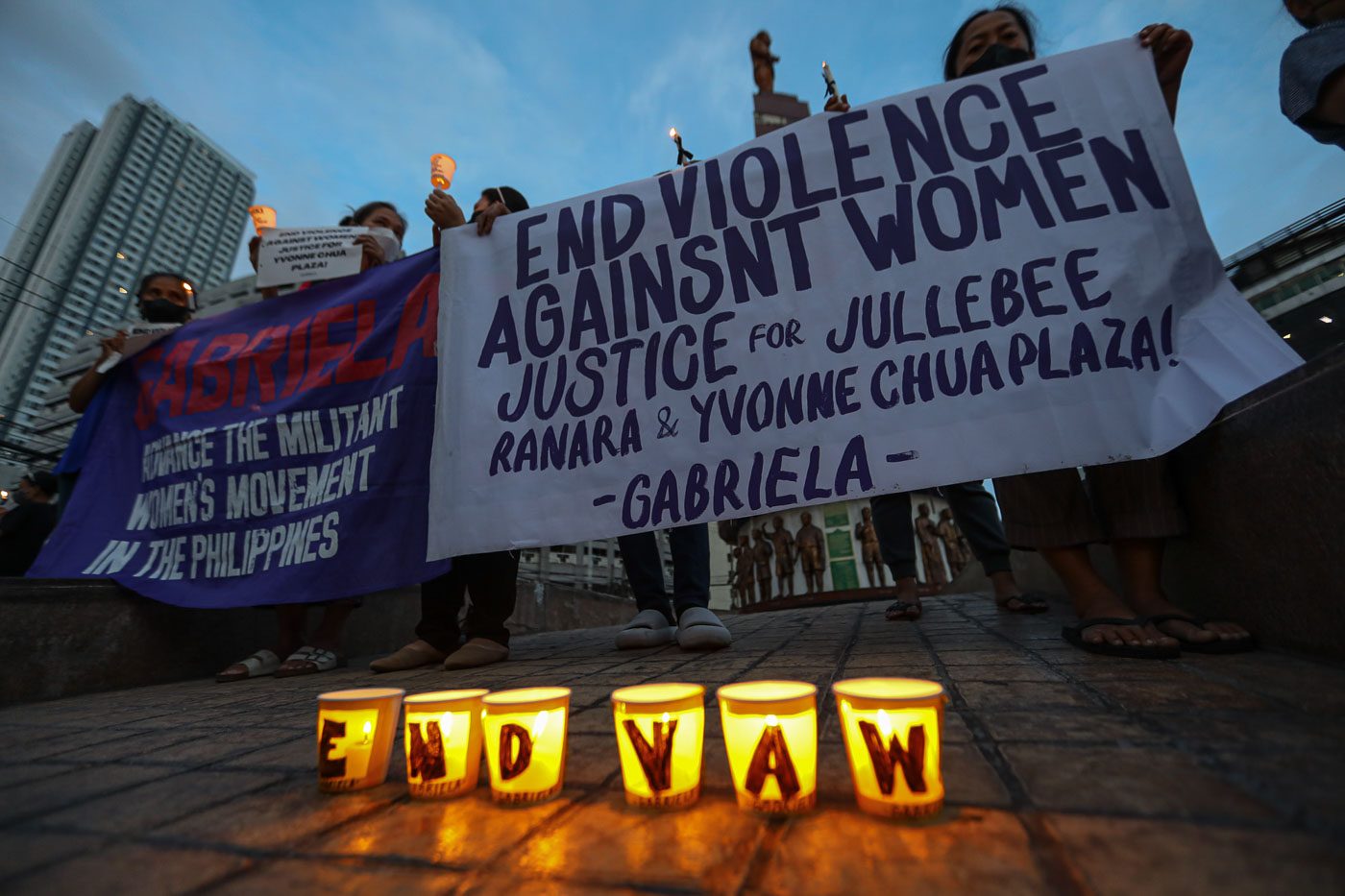SUMMARY
This is AI generated summarization, which may have errors. For context, always refer to the full article.

MANILA, Philippines – News of the tragic killing of overseas Filipino worker (OFW) Jullebee Ranara in Kuwait sent a shockwave across the Philippines, with the governments involved, rights groups, and Ranara’s loved ones calling for justice.
Ranara, a 34-year-old domestic worker, was allegedly killed by the 17-year-old son of her employer. Her burnt body was found in a desert on January 21.
Authorities flew her remains back to the Philippines on January 27, with the repatriation fees shouldered by her employer. Kuwaiti government officials vowed to Jullebee’s family and Migrant Workers Secretary Susan Ople that justice would be served.
Ople, confident that the Kuwaiti authorities are willing to dialogue for labor reforms, thumbed down the option to implement a deployment ban to the Gulf state.
Ranara’s fate is not the first of its kind. While domestic worker abuse is rampant across the Middle East, a popular destination for OFWs, certain deaths of OFWs in Kuwait from before have triggered diplomatic action between the Philippines and Kuwait.
Here are some things to know about some OFWs who died in Kuwait before Jullebee Ranara.
Joanna Demafelis
In February 2018, reports came out of a Filipina’s body found in a freezer in an abandoned apartment in Kuwait. She was 29-year-old Joanna Demafelis, who worked as a domestic helper for Syrian woman Mouna Ali Hassoun and her Lebanese husband Nader Essam Assaf.
Her body was kept in the freezer for nearly two years.
On February 9, then-president Rodrigo Duterte lashed out at Kuwait over the multiple reports of OFWs dying in the region.
“What are you doing to my countrymen?” Duterte asked. “Is there something with your culture? Is there something wrong with your values?”
The Philippines’ Department of Labor and Employment (DOLE) issued a total ban on the deployment of OFWs to Kuwait on February 12. Demafelis’ remains were flown back to the Philippines four days later.
Joanna’s employers were arrested in the Syrian capital Damascus later in February. By April, a Kuwaiti court sentenced the couple to death by hanging over Demafelis’ murder.
In May, the Philippines lifted its deployment ban to Kuwait after the two countries signed a memorandum of agreement (MOA) for additional protection for OFWs in the country.
In September 2019, a Syrian court found Hassoun guilty of murder.
Constancia Lago Dayag
In May 2019, 47-year-old domestic worker Constancia Lago Dayag was declared dead on arrival at Al Sabah Hospital in Kuwait.
Then-labor secretary Silvestre Bello III said she died “in the hands of her employer.” According to Bello, Dayag’s body had various contusions and hematoma, and a cucumber was inserted in her body.
Dayag’s death came just a year after the Philippines and Kuwait signed a memorandum of agreement to better protect Filipino workers.
“I am taking the Kuwaiti government to task for the gruesome death of yet another Filipino worker in the hands of her employer in Kuwait,” said Bello.
“Aside from apparent violation of the agreement on the protection of OFWs between our government and Kuwait, there appears to have been a breach of the employment contract by the foreign employer,” he added.
The Department of Foreign Affairs told media that Dayag’s employer Bader Ibrahim Mohammad Hussain was charged with felony murder.
A Kuwait Times report said that Kuwaiti security sources found in an initial examination that Dayag died of natural causes.
Dayag’s remains were brought back to her home province of Isabela on May 24. Dayag’s eldest child Lovely Jane said in a Philippine Star report that her mother’s face was unrecognizable, and her body had started to decompose.
Lovely Jane said in the report that she did not believe her mother died of natural causes.
Jeanelyn Villavende
In December 2019, the Philippine government “strongly condemned” the killing of yet another Filipina domestic worker in Kuwait, Jeanelyn Villavende.
The DOLE said Villavende was dead on arrival at the hospital and that nurses there reported she was “black and blue.”
According to the DOLE, the OFW’s family last spoke to her in October 2019. When they tried to contact her on December 13, her female employer answered and said Villavende was “busy.”
The Department of Justice said that she was sexually abused and physically battered for weeks before she died. The autopsy report from the National Bureau of Investigation said she had “clear indications” of sexual abuse, and that she had “old healed wounds.”
In January 2020, the DOLE revealed that Villavende informed her recruitment agency of maltreatment and underpayment as early as September 2019, but her concern was ignored.
The DOLE said that the alleged attempt of the Kuwaiti government to cover up Villavende’s true cause of death, and its failure to come into an agreement on the standard employment contract in accordance with the 2018 MOA, prompted the Philippines to impose a deployment ban anew.
The ban was lifted a month later. Bello said the governing board of the Philippine Overseas Employment Administration approved the complete lifting of the ban after murder charges were filed against Villavende’s employers in December 2019. Bello earlier reported that the employers had already been detained by Kuwaiti authorities.
In December 2020, the Kuwait Criminal Court sentenced to death Villavende’s female employer for the OFW’s murder. Meanwhile, according to an ABS-CBN report, the employer’s husband was sentenced to four years of jail for not reporting the crime.
Protective measures for OFWs in Kuwait
What was in the 2018 MOA that Kuwait reportedly kept violating? These are the salient features of the agreement:
- Employers must provide Filipino workers with food, housing, and clothing, and register them in the health insurance system.
- Employers cannot confiscate the passports and other travel documents of Filipino workers.
- Filipino workers must be allowed to use their phones.
- Employers who have records of contract violations or abuse will be disqualified from recruiting workers.
- Employers must facilitate the opening of a bank account under the name of the worker, and allow workers the reasonable opportunity to remit his or her monthly salary to the Philippines.
- Filipino workers will have access to services of Kuwait’s Department of Domestic Labor to settle disputes.
- Transfer of workers to another employer should be with the consent of the Filipino worker or with the go-signal of the Philippine Overseas Labor Office.
- The Philippines must ensure that domestic workers are trained and certified on housework, and have received orientation on Kuwaiti laws and customs.
According to a report from the Kuwait Society for Human Rights on the country’s domestic worker law, it is illegal for employers to assign to their helpers “dangerous work that could affect the worker’s health or humiliate the worker’s dignity.”
In 2017, the Philippine embassy in Kuwait logged around 6,000 cases of abuse, sexual harassment, and rape.
As of December 2022, of the 268,100 OFWs in Kuwait, around 73% are female domestic workers, numbers from the Department of Migrant Workers show. – Rappler.com
Add a comment
How does this make you feel?






There are no comments yet. Add your comment to start the conversation.